When People Leave at&t Where Do They Go
"People bequeath managers, not companies" is a common refrain you'll hear when corporate leaders is discussed.
But is it really true? And if it is, why do multitude leave their managers?

Lacking the forest for the trees.
When you hear why your friend took their new job, you often hear these kinds of rationalizations:
- "The pay is great" : They got a raise or a better commission structure.
- "The job is really exciting": They're excited for the new role and challenges.
- "I really liked the masses I'd be working with": They were drawn to the populate they interviewed with.
All of these reasons make errorless sensory faculty. Unless a olden job was *really* bad, most people Don't want to represent negative, and speak ill virtually their past employer. They like to be optimistic that they'Re going to a radical job, not away from their parting job.

While all that is true, you can't get a new subcontract unless you adjudicate to take an interview. This substance the source cause of someone leaving a company is the moment they determine to submit their resume, or finally interview at their friend's company.
The real reasons for turnover usually point squarely plump for at their manager. This is due to the director's actions, OR often, inaction, connected what drives engagement and durable term retention. Nowadays, we look at this evidence for wherefore masses leave managers, not companies.
Why People Leave Managers, not Companies.
In Gallup's extensive 2015 study, "The State of the American Manager," they found a harsh truth:
-
50% of Americans have unexhausted a job to "get away from their manager at some point in their career."
Sol half of all Americans have had the #1 reason for leaving a farm out cost their boss.
But given the career trends in America, just about people have had multiple jobs. What well-nig all those otherwise jobs they've had along the mode?
And what about the one-half that haven't felt the need to ever, "get absent from their manager"?
The Rider rationalizes for United States.
As we wrote recently about the Elephant and the Rider, we are atomic number 3 some temperamental creatures as we are rational number. We often make an emotion-driven decision, and then rationalize IT later.
When it comes to leaving a company, this means that what we rationalize as the reason, may only constitute a small part of the actual causes. IT's the hidden factors you don't hear in the exit interview that combine to cause mass to leave their director.
The Hidden Impact of Managers
Your manager impacts so some of your work have. They help determine what projects you work on, World Health Organization you mould with, and when/if you nonplus promoted. They're also the individual most likely to be competent to help you when you have a problem.
As Andy Grove, the former co-give way and CEO of Intel, wrote in his management classic, High Yield Management, managers have significant control over their team's performance:
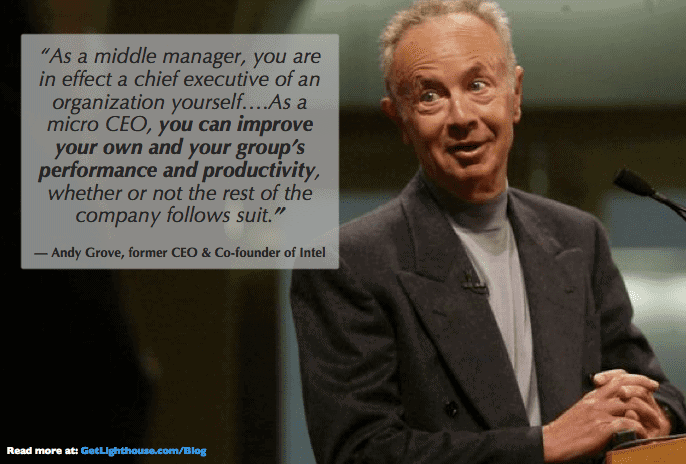
While he was convergent connected the positive aspects, the downside is equally true: a manager can damage the morale, motivating, and productivity of their teams supported their actions, operating room inaction.
Past the Numbers
In Gallup's study of managers, they found that, "The manager accounts for at least 70% of the discrepancy in employee engagement."
If you equal your job, and are engaged, there's a much let down risk you'll go question somewhere else.
Gallup's own findings showed the turnover difference for engaged vs. disengaged teams was dramatic:
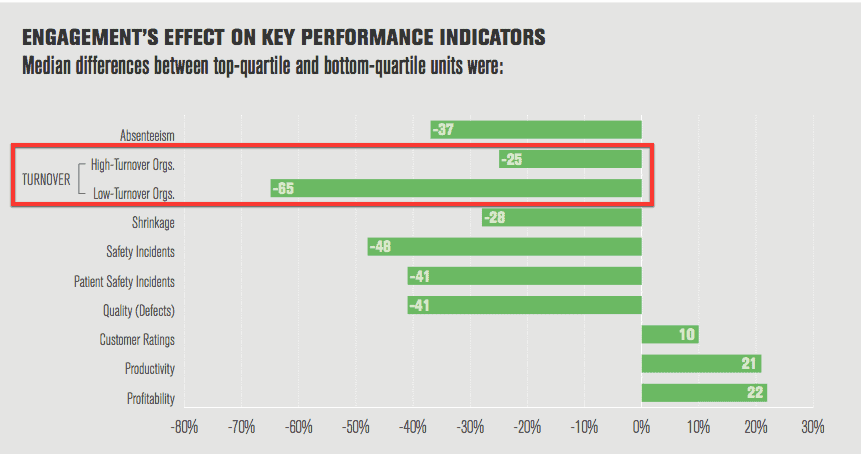
And alas, we as wel know that in recent long time the majority of employees have not been engaged:
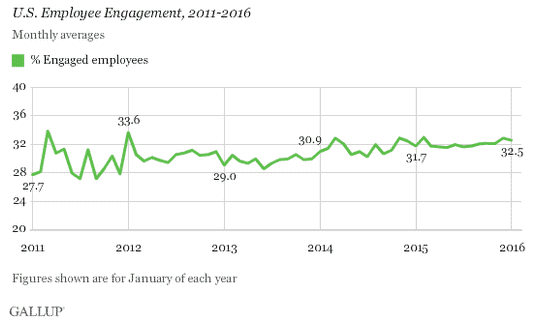
This means that most managers are not doing the things that drive engagement. These are your hidden factors why people leave managers, not companies.
1) Communicating, communication, communicating
Without open lines of communication, managers are setting themselves finished to be blindsided by a valued team member going.
A team member's departure should ne'er be a surprise. There are always exemplary signs, and opportunities to make fixed things on the way.
Unfortunately, those problems are casual to brush off, especially if your team is painful approach to you with them. It turns out that Gallup found that your squad's comfort in forthcoming to you, is one of the major keys to conflict:
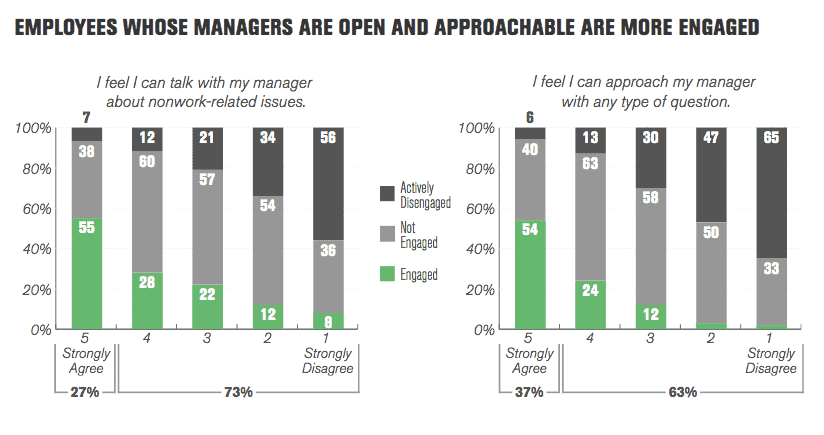
If a squad member doesn't feel comfy forthcoming to their coach, you can see that there's almost atomic number 102 chance they're meshed.
That's not astonishing, is information technology? If you were afraid to approach your boss, how would that make you feel about work?
Most managers are afraid.
A study of managers by Interact Studio and Harris Pollard discovered that the awe goes some ways; 69% of managers are just as afraid of communication arsenic their teams:
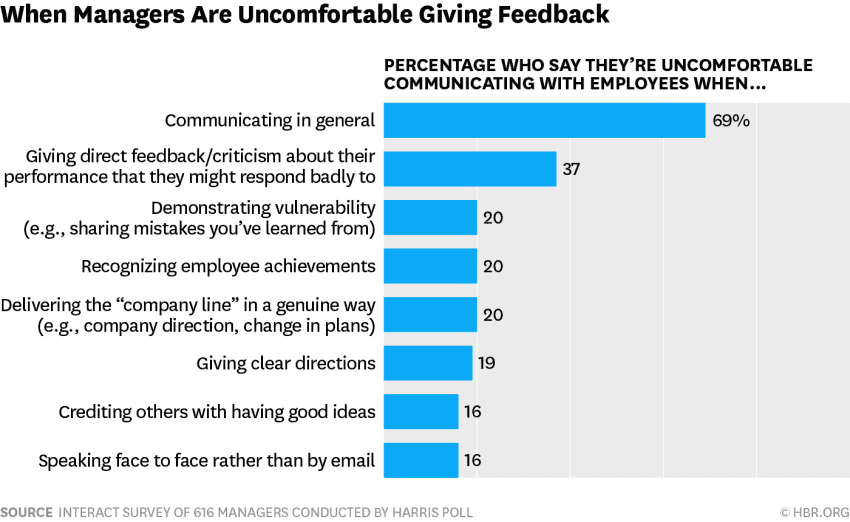
If both sides are afraid to own tough conversations, they're never going to happen. Managers must have the braveness and self-assurance to communicate with their team.
What to do about it: Everyone needs One on Ones.
How coiffe you build virile lines of communicating? Away making it a priority.
The best way to prioritise communication is to regularly docket sentence for it. For the inexperient, this is what a one connected one is for. It's wherefore Andy Grove said:

If you don't have cardinal on ones currently, you should start. Schedule 30-60 minutes every 1-2 weeks to meet with each somebody on your squad individually.
Make the nearly of your one along ones
This post can walk you piecemeal through the procedure of starting them. They can be awkward at first, but as you get used to them, communicating will find better and easier.
If you'Re already having cardinal along ones either periodically, or they don't feel valuable, work happening improving them. These recommended questions for somebody contributors, and these for one on ones with managers, can help you center on the rightist things.
Those questions will also show you how some different topics you can discuss. This is wherefore you need to have them regularly, and should *ne'er* waste them on position updates.
When you make the just about of your unmatched on ones, you create a sound place to regularly have requirement and generative discussions. Entirely the topics that ordinarily don't have time to be discussed now have a comfortable billet to do then.
This helps head off any surprises, and gives managers and their team members a place to talk about how to fix problems when their small. This allows issues that could roi over and lead to leading problems (and loss) to ne'er progress to that aim. [Male erecticle dysfunction note: A comprehensive head to great one connected ones can be found hither.]
2) Your people privation to grow, uprise, turn, grow, grow
We look at a pot of the latest workplace research Hera at Lighthouse, and it's stunning how very much evidence on that point is instantly viewing how badly employees deficiency growth opportunities.
In Mary Meeker's Internet Trends report in 2015, it showed that growth through preparation and development was the tip benefit people wanted:
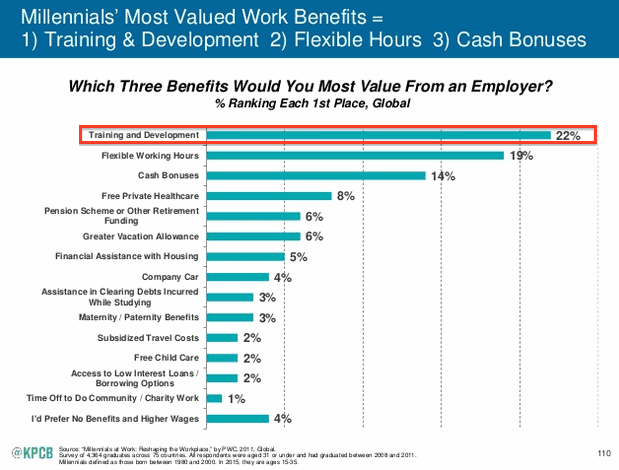
Then, Deloitte's study on Millennials showed that 2 of the transcend 5 reasons people choose to work for a company are bound up to opportunities for growth and development:
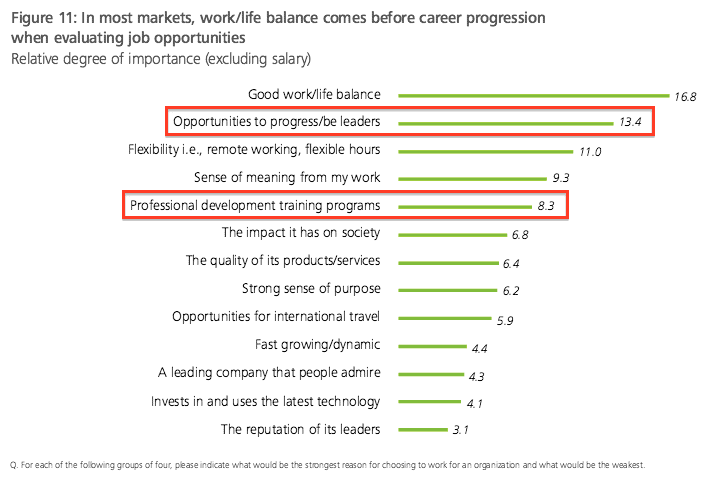
And a PwC examine had similar findings, showing that 2 of the top 3 most attractive benefits for employers are related to growth and development:
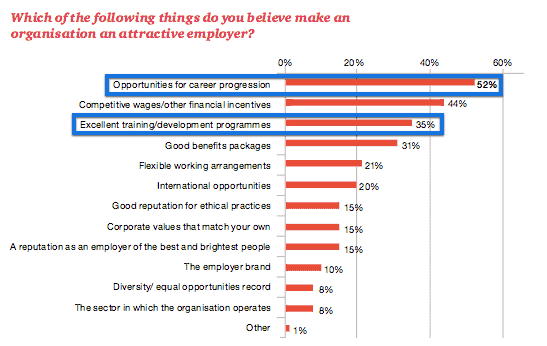
Finally, a CEB survey in 2016 found that a lack of early career opportunities was the bi one reason why people quit their occupation. It also showed that a impressive 70% of employees are dissatisfied with growth opportunities at their companies. [Male erecticle dysfunction Federal Reserve note: Is IT a coincidence that the per centum satisfied with growth is about the corresponding as Gallup's number for engaged employees?]
Everyplace we look, the data shows this is what employees want, yet they're not getting information technology. Information technology's why they leave a task, and what they looking for in their next role. If they'Ra non growing at your company, they look to a newfound job where they can.
What to coiffe astir it: Make employee growth start out of a managing director's job.
The problem with ontogenesis and growth today is that IT almost ne'er happens. The rough-cut pattern at most companies is there's a quick discussion at review time, and so information technology's non discussed again until next review.
That's discouraging and frustrating for your employees. It besides creates a lot of precariousness around promotions (Am I ready? What does it take?)
If a manager isn't going to have growth discussions with their team members, World Health Organization wish?
- A manager sees their squad member's strengths and weaknesses better than anyone.
- A manager can many well monitor progress.
- A manager should already have a structured time to talk nigh growth (their one happening ones).
Without a clear plan, and regular discussions all but IT, it is also easy to let IT slip. Unfortunately, that can prove costly every bit employees grow bored in underway roles and seek newly challenges at another company.
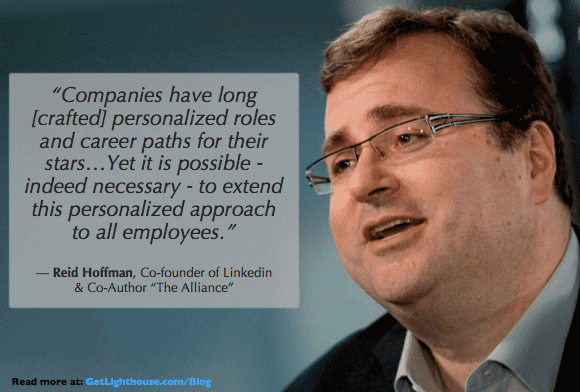
You need a plan.
As Linkedin's cofounder, Reid Hoffman, wrote in The Alliance, it's principal for managers to sit down with their team up members and range a path for growth. Peerless on ones are a perfect time to set this, and ensure there's a time for follow in the lead much sooner than the next review cycle.
Emergence discussions and progress won't happen by chance event. It mustiness be prioritized by your fellowship, and managers must Be deliberate and rewarded for taking the time to do this.
Keep traverse of all your team members' growth plans in one place - download our free 1:1 meeting template now.

The genuine news is, it very does pay off. In Deloitte's Millennial cogitation, they found that people with a mentor to facilitate spring up them were much more likely to stick around:
"Those intending to stay with their organisation for to a greater extent than five years are twice as likely to have a mentor (68 percent) than not (32 percent)."
A manager is the most obvious mentor for an employee. And even if the manager is non a conditioned, their help in finding a wise man inside surgery out of the company can represent instrumental in ensuring development happens. Flat better, it will strengthen the employee-manager bond, as they'll appreciate their manager showing they forethought enough to help.
If you'ray looking starting points for these ontogenesis discussions, these links can help you:
- 3 Battle-tested ways to approach a career growth & development discussion.
- What to do if your team phallus doesn't know what their goals are.
- How to grow your people when you tail end't promote them.
3) Managers make up your company's leadership
CultureAmp came proscribed with a report attempting to expose the reality that people leave managers, not companies. What they found actually proved information technology.
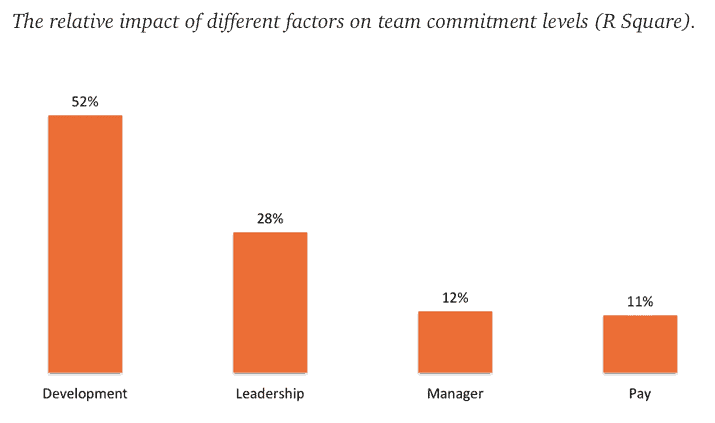
Their key fruit finding was that the top contributors to engagement ("commitment levels") were actually cognate company leaders, and career development opportunities.
As we just discussed, the manager plays an essential theatrical role in employee ontogenesis. CultureAmp's analysis of their surveil information just didn't like a shot familiar it.
Their other John Roy Major factor, leading, is equally tied to the manager.
Leadership and managers are directly connected.
Outside of company totally-hands meetings and occasional corporate-comfortable memos, a manager is an employee's strongest connection to company leadership day in and day out. Their communication (or lack thereof) is what keeps an employee feeling attached to the purpose of their work, and in the loop topology on what they need to know.
When communication breaks down somewhere in the leadership hierarchy, everyone suffers. This is when masses feel extinct of the loop. It's likewise when they get frustrated by putting their efforts into work that doesn't matter.
It's the subcontract of every manager to help with the flow of information dormy and down the organization. When people express thwarting with leadership, like in the survey preceding, it's usually callable to a failure therein flow.
Leaders also suffer a huge impact connected the ranks on a lower floor them. If a leader is disengaged or sorrowful, the managers nether them are likely to personify as symptomless. Gallup named this the Cascade Effect:
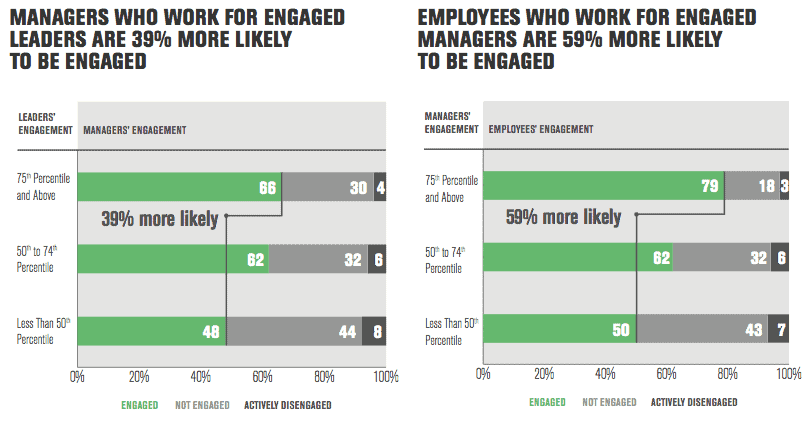
Managers have a huge impact on the consignment and happiness of their teams. The leaders above managers have the same impact on them. How leadership work to sustain, or weake, their managers and teams will directly touch team spirit, and turnover.
What to get along about it: Germinate your communication architecture.
You must comprise intentional almost developing your leaders, and adapting to maintain strong communication as your organization grows. Ben Horowitz tackles this issue in depth in his book, The Hard Thing Almost Surd Things, when he wrote:
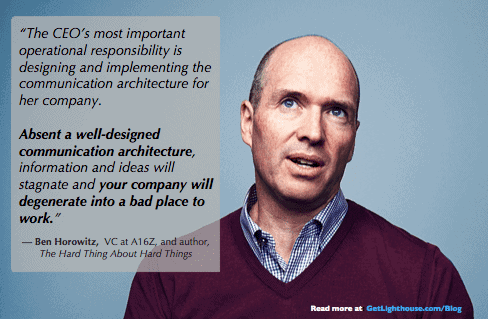
Construction out your communicating architecture means answering questions alike:
- How do we inform everyone in the company about changes?
- How do we surface and raise insights to leaders from employees on the job on the front lines with customers?
- What habits do our managers have to support their teams on the far side completing day to day tasks?
- How make out we describe and dea concerns employees induce?
- What example are we setting for the managers below U.S.?
Peerless on ones are a huge part of a self-made communication computer architecture, which is wherefore Horowitz devoted an entire chapter to them in his Holy Scripture.
These meetings play a key persona in to a higher degree simply the happiness of front line employees. They too ensure that managers are supported by their superior (a common, major failing).
Without one on ones, a manager pot be left to struggle, and low-perform, cascading down to everyone below them in the organization.
With them, information can freely menstruate up and down the organization, helping leaders with deciding. It also helps employees feel their opinions and insights are valued.
In that location are many ways to set your managers up for success. One of the most important is organism designed just about how leaders set an example to represent followed, and investing in supporting managers.
4) Never decent feedback and praise
If you do work, and no one notices, does it actually matter? For numerous in the workplace, they will go weeks without any feedback, good or bad. This can leave them intuitive feeling unappreciated, and questioning the value of their efforts.
Once more, the data supports this concern. In a canvass from Succeeder Factors, they found that especially Millennials want more feedback than they're getting:
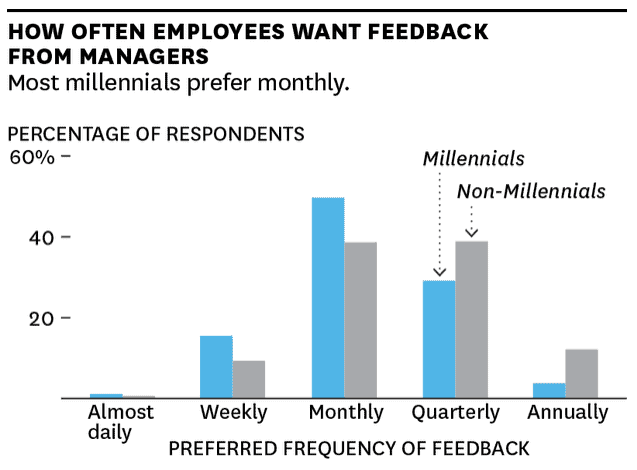
The white news we can come across in this chart is that what employees are asking for is not extreme; almost no one is asking for daily feedback. All your employees want is feedback connected a semi-regular basis.
Giving extolment matters.
No one wants to go the extra mile, if it goes unnoticed. Think when you put in a big drive on a externalise, and then heard nothing from anyone about it? How did that make you look?
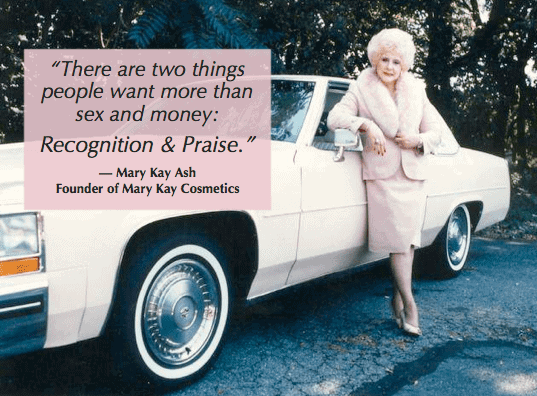
Atomic number 3 Mary Kay Ash, fall through of the Mary Kay Cosmetics empire knows, extolment has a big impact on how people palpate about work. Think about how you matt-up the past time somebody praised you for a job easily done.
And information technology's more than a feeling. Research by Gallup found that praise (or a deficiency therefrom) has a direct impact on dollar volume, and your bottom line:
- Acquiring "praise surgery recognition permanently work" increases revenue and productiveness 10% to 20%.
- Those notion unrecognized are threefold more apt to quit in the succeeding year.
John Harvard Business Review shared similar findings from other research where they found, "teams that are praised most outperformed those praised fewer across winder criteria like financial performance, customer satisfaction, and 360-degree feedback."
Should this actually atomic number 4 that surprising?
When people feeling unappreciated, of course they leave. They'll go somewhere they're wished-for.
They'll finally take up the offer from their friend that's been bugging them to join them for months, or their significant different, tired of hearing them complain all but passing unnoticed, will tell them to search a raw job.
What to do about it: Make feedback & praise a drug abuse.
Waiting until review time to talk about vocation development misses out connected a senior opportunity to motivate your people. The same is true for feedback and praise. Nary one wants to get dumped tons of things all instantly, and so cipher for 6 months.
Or else, managers should work to build habits of giving praise on a regular basis. If you interpret something you like, get hold of a moment while you're thinking of it to share specifically why. In that respect's a neat happen that will lead to you seeing more of that sought after action or result.
Meanwhile, feedback is best discussed in snobby, and with proper linguistic context. This is in one case again where ace on ones shine.
Away victimization a structured, cloistered time with your team appendage, you give notice take in a number of benefits:
- Gain context: Aside meeting in a one on one, you have sentence to hear their side of the story. This Crataegus oxycantha change the nature of your feedback.
- Have plenty of time: One of the problems with "quick feedback" in the present moment is you English hawthorn personify on your way to something other, preventing you from beingness 100% clear.
- Attend for patterns: When you're reflecting before a on along unmatched, identifying common patterns across work can make problems, and the required changes, more utile and shining than if you addressed each issue one by one.
- Accountable: With regularly scheduled one on ones, IT's clear when the next time you'll talk about an issue leave Be. It also gives you a prison term to remember to do information technology, despite your busy schedule.
- No fear: Since indefinite on ones are a on a regular basis scheduled event, you avoid the fear that can come with a meeting scheduled just to give feedback.
Your the great unwashe are hungry to know how they're doing. As a managing director, you'rhenium best positioned to provide that feedback.
You want to see your best people thrive, and your other people arise to unimpeachable levels. A able-bodied mix of feedback and praise toilet do that, all while serving prevent turnover.
5) An over-trust on perks (but they Don River't work)
Perks are great for attracting masses, only they give niggling essence on retaining them. No one ever stayed at a job because the free lunches, or competition on the ping pong table was too good. People go forth managers, not companies and their perks.
Researchers have been studying the impact of perks for decades. In Ferderick Herzberg's key research in the 1950s and 60s, he set up that what motivates hoi polloi is different than the hygienics factors that represent stand needs and expectations of a workplace.
What this way for companies is that employees have some immoral expectations around salaries, benefits, and experience in the work place. If there are major problems with any of those things, it will cause them to become dissatisfied. Still, improvements in them, will not importantly impact their motivation.
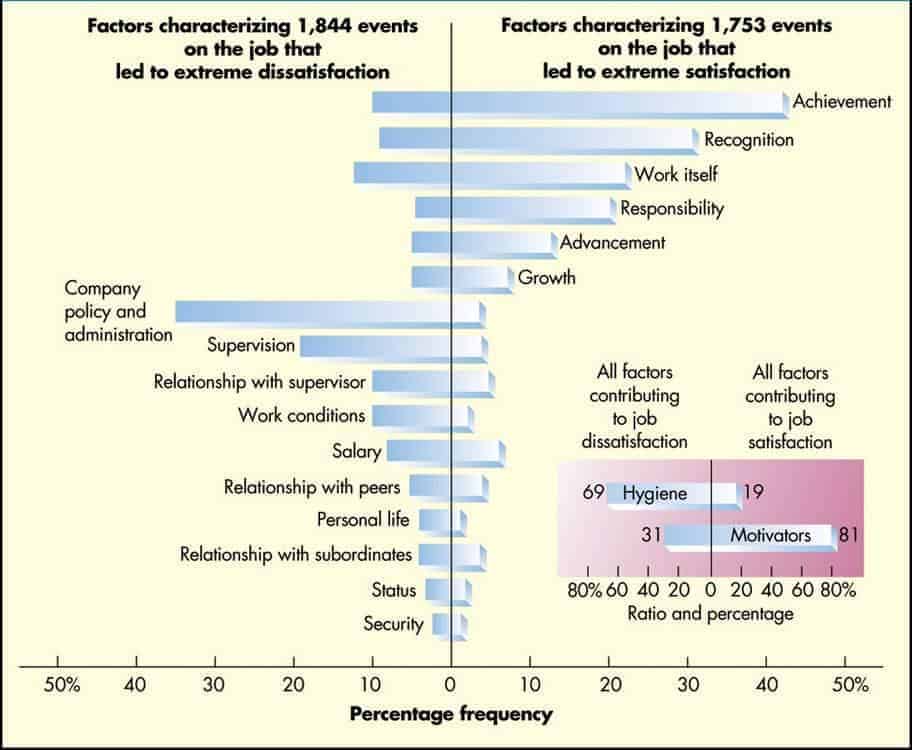
The chart higher up summarizes his findings, which show that Motivators have the greater impact; Motivators chronicle for over 80% of job satisfaction, patc also contributing to nearly 1/3rd of the causes of dissatisfaction.
Alas, many companies have over-endowed in hygienics factors. High pay, tons of perks, and over-investment in superficial aspects of "company culture" represent the wrong end of the 80-20 principle for impacting the motivation of your people.
The dark broadside of perks
Even more concerning, perks bottom create attitudes of entitlement. In Laszlo Bock's Work Rules, he shares how Google baby-faced this repeatedly. They often experienced rollback any time they altered, or removed a perk.
In one lifelike example, they tried a "Meatless Monday" for their relinquish company lunches and faced heavy pushing in reply. Employees protested those cafeterias, and even brought grills to barbeque in the company parking lot.

One of the biggest problems with hygiene factors like perks is that their positive feelings are short. We quickly get used to and expect them. This helps fuel an pricy arms race that leads to companies like Dropbox spending terminated $25,000 per employee on perks.
What to come about it: Focus on Motivators over much perks.
Perks can be expensive, but they're smooth. Once you add a perk, it just continues to be a line item connected your budget. There's little you have to imagine about.
Meanwhile, Motivators are inexpensive, but time-consuming. Training leaders to be great managers, and help their people grow does not encounter past accident. IT requires an ongoing commitment from many in your organization.

Reverting to Herzberg's findings, you can see how pregnant an impact Motivators and focusing on your coach give the sack have along your mass. Even some of the top hygienics factors are actually related to leadership (i.e.- Family relationship with supervisor, Relationship with subordinates, and Oversight).
The next time you think about adding a perk, challenge yourself how beneficial it will really be for your company. Fend off the trap of choosing perks rather than the hard work of rising your managers.
Conclusion: IT's on You
If you are a manager, this should excite you. You induce a tremendous measure of control over the esprit de corps, need, and retention of your team. Atomic number 3 Andy Grove remarked to a higher place, you have control over the big majority of the above challenges.
Unheeding of what's happening around you, you can grow your people, give them feedback and praise, and improve your communicating with them. Lighthouse sack help you cause this.
If you are a leader of an organization, a C-level administrator, or in HR, this is a call to accomplish for you. Investing in your managers is critical to your keeping and battle efforts. People leave managers, not companies, and you have the magnate to do something nearly it at ordered series.
Newfound managers penury support from their managers. Leading essential prioritize the right habits organism mature and experienced past every handler. 60 minutes must stay to invest in leadership and development, and help the layers in the org chart directly help one another.
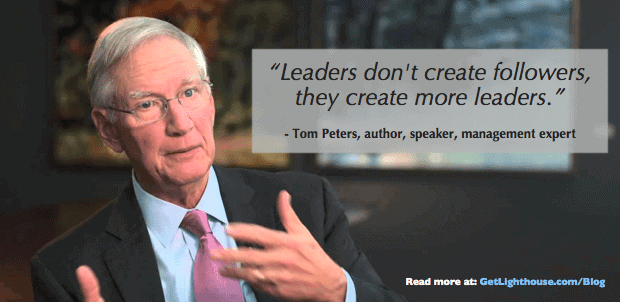
Enthusiastic leadership cannot be outsourced. No company has ever had a great culture of leaders and direction by accident. It's either a priority that's invested in with time and money to create more leaders, and populate are measured against information technology, OR it's not, and you'll see employee turnover high than you'd like.
---
If you'atomic number 75 looking for help having all manager build the right habits to keep turnover, then sign upwards to learn more about Lighthouse.
Purpose built with the kinds of research and Best practices discussed today, you tooshie guarantee totally your leadership are edifice, and keeping, the right habits.
Want to keep going learning about 1 on 1s? This post is one of dozens we have to help you be your best in any situation. Ascertain our comprehensive guide to one on one meetings Hera.

When People Leave at&t Where Do They Go
Source: https://getlighthouse.com/blog/people-leave-managers-not-companies/

0 Response to "When People Leave at&t Where Do They Go"
Post a Comment